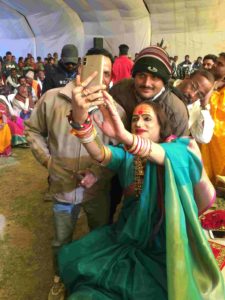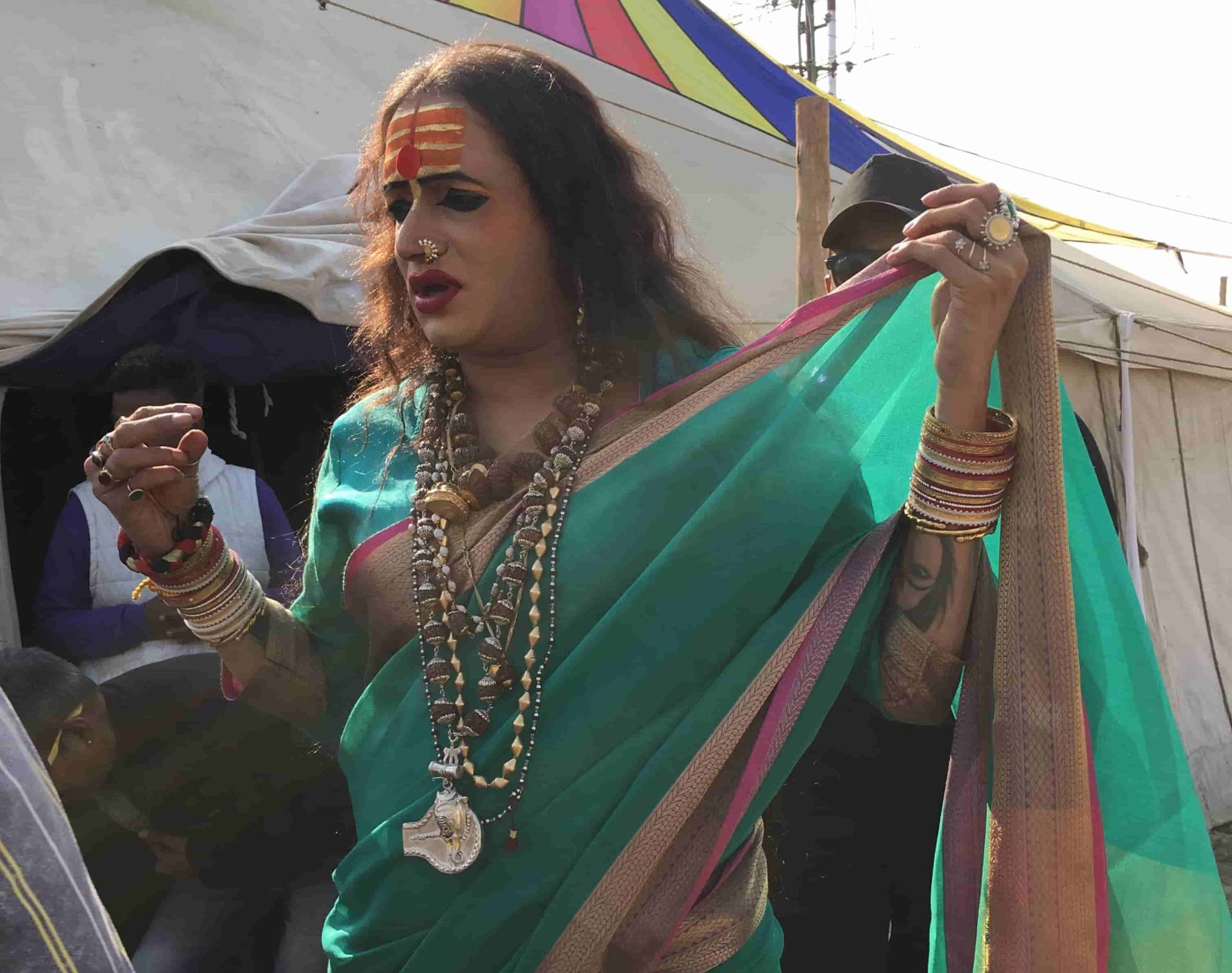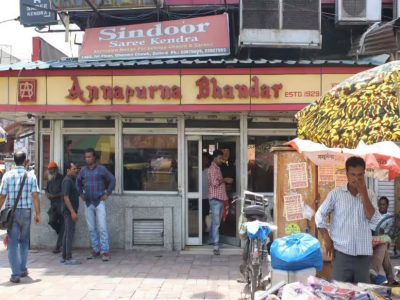The apex court’s support and recognition of kinnars in the Hindu community is changing the attitude of society towards transgenders—but they face discrimination from society at large and within the LGBTQ community
Raju Mani, 32, a transgender, who resides in Noida, is glad to have been part of the processions of Kinnar Akahara during the Kumbh Mela in Prayagraj a couple of years ago. It was a momentous occasion to be accepted by the society, not just as mere humans but as demigods.
“Sanatan Dharma, Kinnar (Hindi) word for transgender) have a special place, the ancient sacred texts describe us Demi-Gods (higher the Brahmins),” declared Lakshmi Narayan Tripathi, the Acharya Mahamandaleshwar of Kinnar Akhara—the most recent and the 14 akhara. She created history by leading hundreds of transgenders to take dip in the holy Ganges on Makar Sankranti for the first time in many hundred years; they had the support of powerful Juna Akhara—or the akhara of the Naga sadhus.
She’s a god incarnate for Raju Mani and it changed the lives of lakhs of kinnar like him. A celebrity blessed with a sense of history, the multilingual Lakshmi Narayan Tripathi has an eidetic memory when it comes to people’s faces. She speaks the Queen’s language with the ease of a native. She had declared, “In the Braham Murat (pre-dawn) when I took the dip, maine atma se shingaar kiya (My soul was my ornament). It felt like a homecoming. Aisa laha jaise beti apane maike aaya hai pachaas saal baad. (I felt as if I’m a married daughter who returned to her mother’s home after fifty years).”
Praising the Supreme Court for affirming that transgender rights are guaranteed in the constitution. “No one has the right and the power to intrude into our religious freedom when the constitution does not discriminate against us. The recent ruling of the Supreme Court gives us protection and more rights in society. Many members of the transgender community were living in fear or were shy, now feel empowered to speak up,” she added.
Raju Mani from Bihar, born to a backward class family has been living with the kinnar community for two decades and had been in Mumbai for three years, before coming and settling in Delhi. He considers himself a singer and dancer, and that he’s overly emotional, makes him even more vulnerable. And does not shy away from speaking his mind. “I feel discriminated against by the society at large—but also within the LGBTQ community. We feel like an outcast and never were the priority. I’m scared to say this, I can’t face them now that I have spoken the truth, also some of the people even in my community will not like it. That’s why I’m using my family name,” he says. He’s not supposed to be talking to a journalist
Mani explains in Hindi that there’s a method, a system, we are all part of a larger arrangement, and that arrangement is important, for it gives us the strength, together we work to make each other’s life better. But there are frustrations and regrets. Mani is illiterate. “It pangs more because I’m a kinnar,” he stresses. He has many things to say, and his own thinking is shaped by life’s experience, life’s not very kind to him.
He wants to learn. A mobile phone with an internet connection is his teacher and friend, is active on online dating sites, and has customers in Noida and Ghaziabad. He takes care of himself to serve his customers better, his positive attitude has ensured his situation is much better than many of his peers. “I think about larger goals in life. The pursuit of happiness.” The ability to express oneself via music and art, to be loved, have a family, to take care of parents—he hasn’t met for ten years.

And then he looks around himself, and is witness to subtle changes in the society, “People are coming out, most of my clients are men, they like being with me, but I’m the forbidden secret of their life, they’d rather prefer to take to their grave,” he says in Hindi, fairly animatedly, words come out if his mouth loud in quick succession as if a street performer. To me, it felt like an outpour of grief.
During the pandemic, he took care of an older gentleman—his regular client for many years—who lives alone in a congested locality in Ghaziabad. His wife is dead, children are living abroad. “He needs care. I’m the caregiver. We share a bond. He’s grateful and he wants to help me read and write but I’m too old for it. I’m his family, but he wants it to remain a secret, not that I take care of him, but that I’m a eunuch.” He adorns jeans and a shirt when he visits this old man, never wears makeup on his expressive conical face.
And that he’s different has never made him feel less even if the people try to belittle him. In our LGBTQ community, transgender are looked down upon, he explains—for most of the people like me—poor, dark and skinny, lack manners, and most importantly, can’t speak in English—the language that the world understands.
Two years ago, during the pre-pandemic times, when pride marches were held regularly, “I’d feel like an outsider there.” The people who control the show are from rich families, they speak good English, their family is supportive of their sexual preference, and they have their genitals.” He explains how people use their proclivity to same-sex to secure a better career, business contracts.
“The pride marches are like a picnic, a carnival for them—the affluent. They come out with family and friends—sexuality is the new fad for some,” he says and contrasts his own situation. “For us, it’s a reality check. A sense of alienation is growing.” He speaks about his own sexuality. “I’m a transgender, but I’m not gay. I dream of being with a woman. I don’t mind men, they get the business. I was forced into this by circumstances beyond my control—I was born like that. They call us extortionists—but what options do we have?” he retorts.
He believes that there’s a perceptible change in people’s attitude—a silent revolution of sorts—the recognition of the third gender at least in the government documents. “There’s religious acceptance amongst Hindus. Lakshmi Narayan Tripathi is our saviour. And she was able to do so much because she’s an excellent orator—both in English and Hindi,” he adds as a qualifier. “To be able to lead, and be heard, you have to speak good English. Only then people will take note of you outside your community,” he explains.
There have been many instances, Mani points out, of Muslim eunuchs converting to Hinduism—because of this newfound religious recognition. This has caused some upheavals in the community. Many oppose it as a communalisation of the kinnar community and blame RSS and the BJP government for it. Laxmi’s guru and journalist, writer, activist, Ashok Row Kavi calls these rabble-rousers “English speaking pseudo-liberals” and considers them part of the problem. He confirmed that many Muslim Kinnars converted to Hinduism.
The whole life is staring at the proud Raju Mani who’s trying to make sense of it. “I don’t want to die an anonymous death—a destiny for most of us.”





